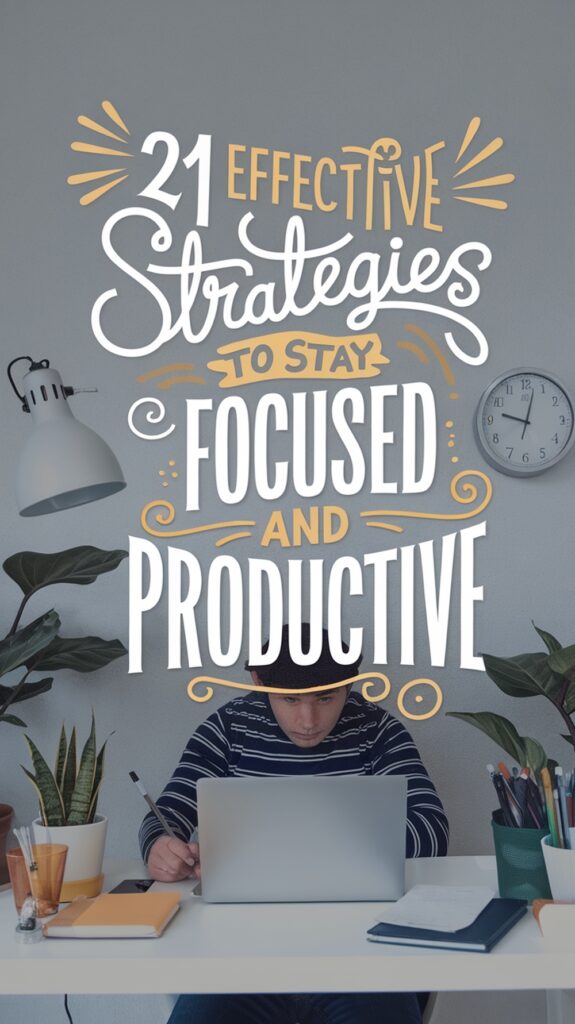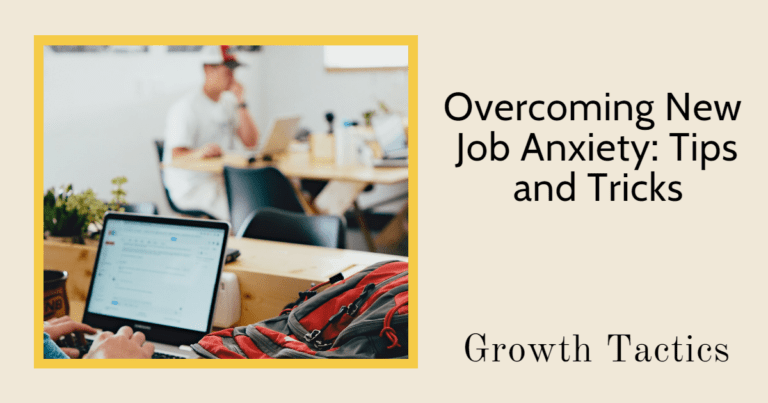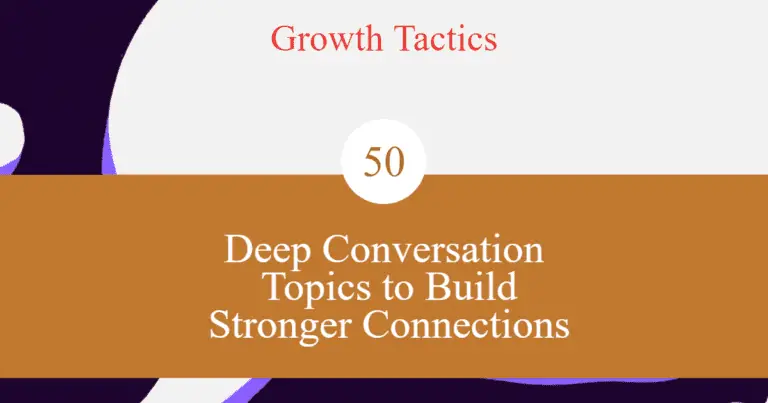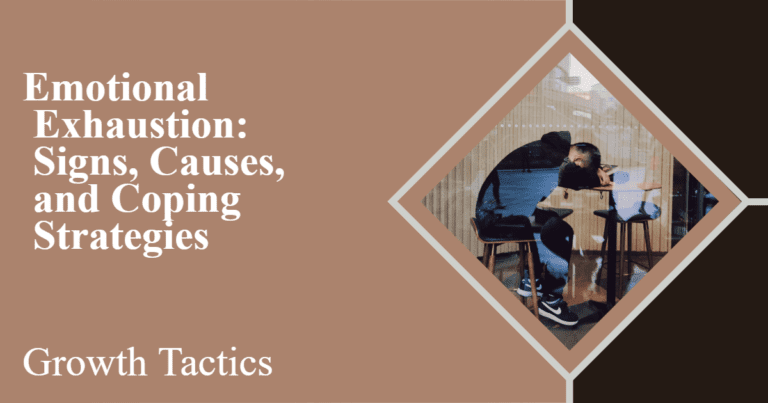Staying focused is all about keeping those distractions at bay. Life is full of noise and lots of other stuff to distract you and make you lose your focus.
Believe me, I know it’s hard not to zone out. Simple tips, such as taking frequent micro-breaks, using lists, and creating a distraction-free environment, can have a huge impact!
In this post, I’ll pass along some practical tips I use on how to stay focused during your busy life.
Jump To Section
What Exactly Is “Focus,” Anyway?
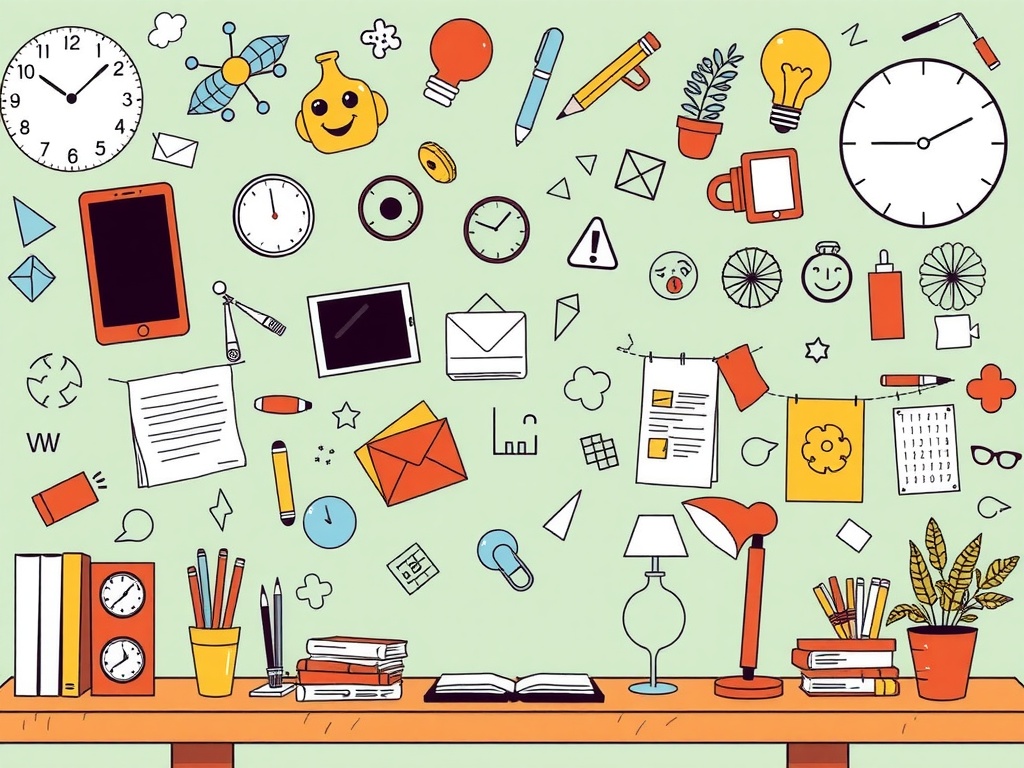
Focus is the ability to direct your attention toward a specific objective or outcome. With our busy lives and distractions coming at us left and right, being able to focus can make a huge difference in getting stuff done right and on time.
So when you focus, you’re shining a laser beam on what’s most important. It’s invaluable for tuning out the noise that doesn’t really matter. This means everything from the sound of children playing outside to worrying about tomorrow.
Why Your Focus Keeps Vanishing

Focus can go out the window fast, even for people who wake up with a detailed to-do list. It isn’t only the noise of the outside world, but all of the chatter happening inside your own mind.
Anxiety and exhaustion from day-to-day life can zap your mental reserves. If you’re looking at your phone or email every five minutes, your brain doesn’t have a chance to reset. Research indicates that once you get distracted, it can take 23 minutes on average to fully regain focus.
The Modern Distraction Epidemic
Phones buzz, TVs glow, and social media is 24/7. All of these distractions chip away at your attention.
Most of us experience our work severely interrupted by the regular ding of notifications. Creating established guidelines for when to use devices can be effective. Disabling alerts or implementing a “no phone” policy for specific times is great for boosting your focus.
Internal Roadblocks: Your Own Mind
It’s not just the world outside our windows. Things like self-doubt and anxiety rush in and steal your attention away from the things that you’re trying to get done. Practices such as mindfulness, deep breathing, or taking a short break can help alleviate the internal roadblocks of focusing.
The Sneaky Sabotage of Multitasking
Multitasking actually reduces productivity by as much as 40 percent. Your brain needs to reorient every time you switch between tasks. Research tells us that single-tasking is better for your brain and typically your productivity.
Experiment with the Pomodoro technique. Focus for 25 minutes on a single task, then spend a few minutes resting. Then focus again for 25 minutes. You’ll be amazed at how much more you accomplish.
When Your Environment Works Against You
Noise, clutter, and bad lighting can all be distractions that lead to a lack of focus. Create a peaceful and organized space to work in. Look at what’s on your desk and put only the things you need. Put the things you don’t regularly use away.
Your Action Plan: Boost Focus Now

Developing improved focus requires consistent practice and the development of new routines.
The action plan below takes that focus and translates it into concrete actions. Following the steps below will help you keep moving forward toward a more focused, more productive individual.
1. Declutter Your Digital Life to Remove Potential Distractions
- Unsubscribe from emails that don’t add value.
- Remove unused apps from your phone, tablet, and computer.
- Turn off push notifications for non-essential apps.
- Put documents and apps into labeled folders e.g. work, home, finances, etc.
Take a break from digital technology. Set aside a few hours a week to go without. This short break allows your mind to regroup and prevents the impulse to switch between tabs.
2. Craft Your Ideal Focus Zone
A space that just feels good is conducive to a better flow of work. Create a productive environment. Clear desk, cozy chair, good lighting.
Experiment to find out where you focus best, near a window, with music playing, or in complete silence.
3. Master the Art of Single-Tasking
Single-tasking works better than multitasking. Set your single most important task. Eliminate those that aren’t important, and set a timer to work on one task at a time for a predetermined amount of time.
4. Harness Smart Time Management Tricks
Chunk large projects into smaller, manageable tasks. Schedule focused work. Schedule your most important work in set blocks of time on your calendar.
This keeps your brain from getting fatigued and helps keep daunting tasks more manageable.
Here are some additional time management hacks you can try:
- Time Blocking: Allocate specific blocks of time for different tasks throughout your day. This method gets you prepped in the right way. It reduces distractions, since it’s clear when you’ll be focused on each task.
- Prioritize with the Eisenhower Matrix: Use this tool to categorize tasks based on urgency and importance. Identify what matters most, and assign or get rid of lower-priority tasks that don’t drive meaningful progress toward your goals.
- Set Clear Goals: Define SMART goals (Specific, Measurable, Achievable, Relevant, Time-bound) for your projects. This level of clarity keeps you focused and, more importantly, motivated as you start to see progress.
- Use Digital Tools: Leverage apps like Trello, Asana, or Todoist to organize tasks and deadlines. These tools can assist you in visualizing your workload and consolidating everything in one place.
- Establish a Routine: Create a daily schedule that includes dedicated time for work, breaks, and personal activities. Routines help condition your mind to focus during particular times.
- Practice the Two-Minute Rule: If a task takes less than two minutes to complete, do it immediately instead of putting it off. This prevents minor things from building up and becoming a burden to you in the future.
- Reflect and Adjust: At the end of each week, evaluate what worked and what didn’t. Iterate and improve your approach to sharpen your time management skills over time.
5. Take Breaks That Actually Recharge
The quality of breaks is key. Short, infrequent breaks are worse than short, regular ones. Whether it’s standing up, stretching, taking a quick walk outside, or grabbing a glass of water, it’s important to fully disengage.
Everyone’s ideal recharge looks a little different. Experiment with breaks to find what best re-energizes you.
6. Create an Organized Workspace
A tidy, organized work environment is another important factor when it comes to eliminating distractions and improving focus. When each thing has its own place, it does help with visual clutter.
This clarity frees your mind to concentrate on what you’re doing rather than being distracted by loose sheets or papers not in their place. A well-organized space conveys feelings of calm and control that can help reduce anxiety and improve focus.
Keep only the most important and relevant tools and resources within arm’s reach. This fosters a tranquil space that inspires productivity, helping you to get in the flow of your work.
Mental Strategies for Enhanced Focus and Motivation

In many ways, staying focused is about mind over matter. It all comes down to how we condition our minds.
Focus is not something that others are born with or inborn. It’s a skill, and like any skill, it gets better with practice and these mental strategies can help you get there.
Practice Daily Mindfulness Moments
Mindfulness helps root us in the moment. These are simple techniques you can use every day:
- Deep breathing: Slow, steady breaths calm the mind.
- Short meditations: Even five minutes can clear mental clutter.
- Body scans: Notice tension and let it go.
- Mindful walking: Pay attention to each step, especially in the warm sun.
- Gratitude check-ins: Pause to notice what’s good in your life.
Mindfulness apps, such as Calm or Insight Timer, are effective in helping you achieve a better you.
Train Your Brain Like a Muscle
Just like any other muscle, mental strength develops with practice. Brain games, such as crosswords or Sudoku, are designed to exercise memory and attention.
Even simple puzzles can go a long way in developing the skills you need to be more focused. The trick is to make a habit of it.
Choose to Be Fully Present In the Moment
Being present in the moment is powerful for keeping distractions at bay. When you focus on what you’re doing right now, you can think more clearly and accomplish tasks more efficiently.
This means putting away your phone, closing unnecessary tabs on your computer, and possibly letting others know that you need some quiet time. By being present and engaged, you can boost your productivity and get more done in less time.
Fuel Your Brain: Lifestyle Tweaks
Your lifestyle makes a big difference in how well your brain functions. From your plate to your pavement, subtle shifts can make a big difference in keeping your mind quick and your focus fierce. Here’s a preview of the four daily lifestyle changes you can make to stay mentally sharp.
Sleep: Your Non-Negotiable Focus Fuel
Sleep is your non-negotiable focus fuel. According to NIH, most adults need 7 to 9 hours per night. When you don’t get enough sleep, it becomes difficult to focus or retain information.
And it’s not just about how much sleep you get, it’s also about quality of sleep. As a person living with sleep apnea I can tell you that quality of sleep has a huge impact on focus and productivity.
Consider going to bed and getting up at the same time every day, including weekends. Make your room dark and temperature-friendly. Put your phone away at least an hour before bed. This is how you give your brain the time to recover and perform at its best for the following day.
Eat Smart for Peak Mental Clarity
What you eat fuels your brain. Try these foods for more focus:
- Dark leafy greens (like spinach)
- Berries
- Beans
- Nuts
- Whole grains
- Fish (like salmon)
- Olive oil
Stay hydrated. Don’t wait until you’re thirsty. Drink water throughout the day to help your mind stay sharp. A high-fiber diet helps keep your blood sugar levels stable, and this is important for maintaining clear mental focus.
Eat mindfully. Eat more slowly, concentrate on your food, and chew more thoroughly. This ensures that you remain in the moment and enhances your attention.
Set Daily Goals to Move Your Body, Sharpen Your Mind
If you want to fuel your brain, exercise should be at the top of your list. Just a few minutes of movement, even a 10-minute walk, makes a huge difference in how we feel and function.
Allow time for at least 75 minutes of vigorous movement per week. Even brief movement breaks, such as stretching, help stave off tiredness. Daily physical activity improves mental health and can make your brain work more efficiently.
Connect With Nature’s Calming Power
Getting out into nature can reduce stress and improve concentration. Whether you take a daily walk or simply sit in the park, you’re allowing your brain a much-needed rest.
Nature has the ability to restore your calmness and mental sharpness.
Long-Term Focus Habits for Sustained Success
Building long-term focus habits is a process, not a single step. The only way to create lasting change is through the little things, done consistently, day in and day out. While the end goal is to be more focused, we need to think of the goal as doing a few things each day to be more focused.
True long-term focus is an everyday effort, not a one-off victory. Keeping at it, even when the change seems slow or non-existent, is what consistently yields true results in the long run. It’s pretty simple to get out of the gate with grand ideas, but very often the momentum fizzles.
What sustains you is falling in love with that daily practice and not just that final product.
Build a Consistent Daily Routine
A regular daily routine creates an environment conducive to attention. I’ve discovered that scheduling time for concentrated work, along with frequent breaks, is the best way to stay mentally fit. Life is surprising at times, so I try to be nimble and shift my schedule if necessary.
This makes my routine serve me, as opposed to me serving my routine. Incorporating small rewards or variations to the routine helps maintain interest, making it more manageable to adopt and maintain the behavior.
Regularly Assess Your Mental State
Being vigilant about your mental and emotional state is crucial. I personally enjoy journaling a few sentences every evening to identify these patterns. This allows me to understand what is actually working and what areas need the most improvement.
Getting feedback from trusted friends or mentors can help identify blind spots in your long-term focus habits. Tallying up honestly is a great way to catch yourself when you’re starting too many things and getting distracted.
Know When to Strategically Switch Tasks
At times, working on a single project for too long may do more to sap your energy. Now I consider my energy and workload when switching tasks. Whether it’s a simple to-do app or something more elaborate, having a mechanism to track what’s due next helps maintain momentum.
Having the ability to know when it’s time to switch gears prevents me from getting burned out or losing motivation.
Seek Support and Accountability
Knowing that you will have someone to check in with makes a huge difference in motivation. Whether it’s a colleague or just telling a friend what you plan to do, having others involved helps you hold yourself accountable.
Having others in your corner takes some of the isolating weight off, and it’s proven to help you stay focused on the long game.
Conclusion
We know that staying focused requires genuine effort, but shifting just a few things every day can lead to some significant progress overall. Pick a few of the suggestions in this article and find what best suits you in your journey. Maybe it’s cleaning your work area. Or perhaps put your phone on do-not-disturb mode before you start working. Or perhaps go on a brief walk outdoors in natural light.
Experiment with different techniques until you discover what works best. Everyone makes mistakes, so distractions will always happen. What’s important is that you keep at it. The future is in your hands. Choose the habits you want to adopt and get started today.
